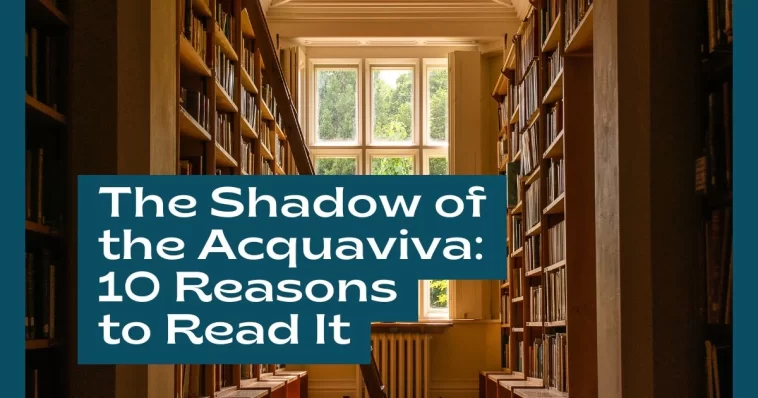Every once in a while, a novel comes along that feels both timeless and completely of the moment. It pulls you into another era while quietly reminding you of your own world. Valeria Corsini’s The Shadow of the Acquaviva is exactly that kind of story. First published in French in July 2025, this 198-page historical mystery unfolds in the dazzling yet dangerous world of Renaissance Italy. Although originally written for readers aged 12 to 18, its intelligence, emotional depth, and vivid atmosphere have also made it a favorite among adult readers.
At the center of the story is Giulio Acquaviva, Duke of Atri, a man of immense power and ambition who is haunted by a prophecy that foretells his death by decapitation. His desperate attempts to outsmart fate unravel a complex web of secrets, betrayals, and moral choices that will keep readers hooked from start to finish. But The Shadow of the Acquaviva is not just about prophecy and power. It is a story about the human struggle against fear, ambition, and destiny. Here are ten reasons why this haunting novel deserves a place on your reading list.

10 Reasons to Read The Shadow of the Acquaviva Today
1. A Vivid Journey Into the Heart of the Italian Renaissance
Corsini transports readers straight into the golden age of the Italian Renaissance with a level of detail that feels almost cinematic. Her version of Italy is not a still painting or a postcard. It is alive, full of movement, politics, and quiet danger. You can practically hear the echo of footsteps on marble floors and the rustle of silk gowns as the story unfolds.
From grand feasts under frescoed ceilings to secret meetings behind closed doors, each scene feels authentic and rich with atmosphere. Readers who love historical novels, such as The Name of the Rose or Wolf Hall, will appreciate how Corsini brings together beauty and danger. She captures the dual nature of the Renaissance: a time of art and enlightenment, but also of superstition, power struggles, and fear.
2. A Prophecy That Feels Like a Character of Its Own
The prophecy that predicts Giulio’s death is not just part of the plot. It feels like a living, breathing presence that haunts every page. Corsini writes it as though it were a silent character following Giulio wherever he goes, shaping his decisions and deepening his fear.
This element gives the novel a haunting rhythm. As Giulio tries to escape what seems inevitable, readers feel his growing desperation. The prophecy toys with both his mind and ours, making us question whether his downfall is written by fate or caused by his own choices. This tension between belief and reality makes the story impossible to put down.
3. A Hero Who Is Brilliant, Flawed, and Utterly Human
Giulio Acquaviva is not your typical Renaissance hero. He is intelligent, powerful, and charming, yet also deeply human. His fear of death drives him to make choices that reveal both his brilliance and his vulnerability.
Corsini paints him with honesty and compassion. He is ambitious and proud, but also haunted by doubt and guilt. His internal conflict makes him feel real, like someone you could almost reach out and speak to. Readers will recognize themselves in his struggle—the desire to control one’s future, the fear of losing everything, and the quiet hope that maybe destiny can be rewritten. Giulio is not perfect, and that is exactly what makes him unforgettable.
4. Emotional Intensity Interwoven with Political Intrigue
One of the most striking things about The Shadow of the Acquaviva is how seamlessly Corsini blends emotional drama with political suspense. The story shifts between the private and public worlds of power, illustrating how every decision, alliance, and betrayal has both political and personal consequences.
The women in Giulio’s life are particularly compelling. They are not background figures or decorative muses. Each one has her own ambitions, flaws, and moral struggles. Corsini gives them agency and voice, revealing how women in a world ruled by men could influence the course of history in subtle but powerful ways. Through these relationships, the novel examines how love, loyalty, and politics intersect in ways that frequently lead to tragedy.
5. A Story That Balances Suspense with Reflection
Although The Shadow of the Acquaviva is filled with tension and mystery, it is not just a fast-paced thriller. Corsini balances suspense with moments of quiet reflection, allowing readers to catch their breath between the bursts of drama. Each revelation feels earned, and each secret adds another layer to the story.
Corsini understands that a great mystery is not only about what happens but why it happens. She gives readers time to sit with Giulio’s thoughts and fears, to understand what drives him. The result is a story that stimulates both the heart and the mind. You turn the pages quickly, but you also pause often, thinking about what it all means.
6. Themes That Resonate Beyond Time
At its core, The Shadow of the Acquaviva explores timeless questions about fate, fear, and the human need for control. Giulio’s desperate attempts to change his destiny mirror our own struggles to manage the uncertainties in our lives.
Corsini reminds us that the real danger of prophecy lies not in the words themselves but in how we react to them. The more Giulio fears his fate, the more he brings it closer. This creates a cycle of fear that feels painfully familiar in today’s world. The story resonates with anyone who has ever worried excessively about what the future might hold.
7. A Profound Reflection on Power and Legacy
Giulio’s life revolves around his title and the dynasty he represents. Corsini uses him to explore the heavy weight of legacy—the idea that power can both elevate and destroy. The Acquaviva name promises greatness, but it also traps Giulio in expectations he can never fully escape.
The novel raises powerful questions about what it means to inherit power and what it costs to keep it. Is greatness something passed down, or must it be earned? And at what point does preserving a legacy become an act of self-destruction? These ideas lend the book emotional gravity, making it both thought-provoking and gripping.
8. Lyrical Prose That Captures Emotion and Atmosphere
Corsini’s writing style is lyrical and evocative without ever feeling heavy-handed. Her descriptions pull you in through all five senses. You can almost smell the ink on parchment, hear the murmur of voices in dimly lit halls, and feel the chill of early morning air over the Adriatic.
Her prose is elegant but never distant. She writes with restraint, allowing emotions to rise naturally through dialogue and imagery. The effect is powerful and lasting. Corsini’s words create not just a story, but an experience—one that lingers long after the book is closed.
9. A Compact Story with Expansive Depth
At fewer than 200 pages, The Shadow of the Acquaviva proves that a story does not have to be long to feel complete. Corsini’s storytelling is focused and deliberate. Every scene matters, every word has weight, and nothing feels wasted.
Despite its brevity, the novel carries immense depth. You can finish it in a single weekend, yet it will stay with you for weeks. Many readers describe returning to it again and again, drawn back not only by the story but by the emotions it stirs. It’s one of those rare books that feels larger than its length, expanding in meaning the more you think about it.
10. A Reflection of Our Modern Fears and Desires
Although the story is set in Renaissance Italy, its themes feel remarkably relevant to our time. Giulio’s fears—his obsession with control, his anxiety about failure, his struggle to understand his place in the world—are fears many of us still carry today.
Corsini captures the essence of human vulnerability in a way that transcends history. Through Giulio’s downfall, we see the same forces that shape our own lives: ambition, insecurity, and the endless desire to outwit fate. The Shadow of the Acquaviva reminds us that while the centuries change, the human heart remains the same.
A Haunting Masterpiece of Fate and Humanity
Valeria Corsini’s The Shadow of the Acquaviva is more than a historical mystery—it is a meditation on destiny, ambition, and the fragile nature of power. She brings the Renaissance to life with such realism and emotion that it no longer feels like history but something immediate and deeply personal.
What makes this novel so powerful is its balance. It is intelligent without being distant, emotional without being dramatic, and beautifully written without losing clarity. Corsini manages to blend historical storytelling with psychological insight in a way that few writers can.
If you are searching for a story that challenges your mind and stirs your heart, The Shadow of the Acquaviva belongs on your bookshelf. It is not just a tale about a doomed duke or a centuries-old prophecy. It is a story about what it means to be human—about fear, hope, and the choices we make when we feel the shadows closing in. In the end, Corsini reminds us that even when destiny seems fixed, the courage to face it is what truly defines us.



